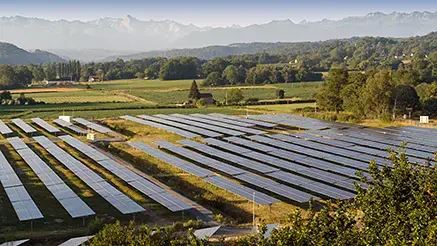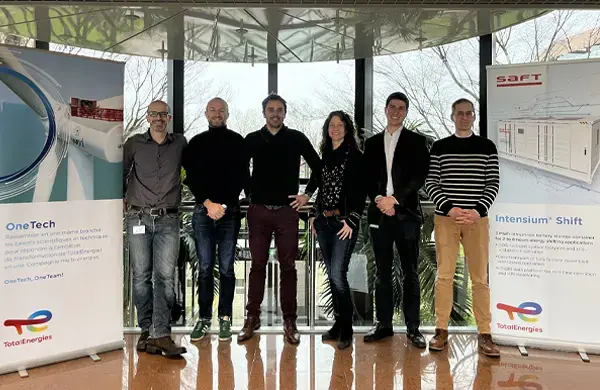
Solar power: a mature technology to serve the energy transition
Having embarked on an ambitious energy transition since 2018, TotalEnergies is banking on renewable energies, and on solar power in particular, to produce 100 TWh of green electricity by 2030 (75% solar, 25% wind). At the heart of the strategy, the teams at the CSTJF in Pau and in Saclay are paving the way for more energy efficient and sustainable solar power, through innovation and environmental responsibility.

"Solar power is a key technology to achieve net zero in all of our activities by 2050, owing to its maturity, how easy it is to deploy on a large scale, and its increasing potential yield thanks to progress in technology."
Matthieu Vert-Foussats,
Senior Onshore Power Architect - CSTJF Pau
TotalEnergies is aware that renewable energies are set to play a major role in the coming decades and began its energy transition in 2018 with the determined ambition of becoming a multi-energy player. In line with the 2015 Paris Agreement and the IPCC reports, the strategy aims to progressively reduce oil production and increase that of gas, a transition energy, then renewables. The target the Company is aiming for is to ensure the carbon neutrality of all its activities by 2050, together with society, and it is banking on solar power to meet the challenge. Considered as mature, the ease of deploying it on a large scale and with a growing yield potential, this technology should represent the main share of its decarbonized mix in the long term.
As both a solar power developer and producer, TotalEnergies is present across the entire value chain, from ‘permitting’ to solar farm design, construction and operation, through site maintenance or disassembly.
In 2025, TotalEnergies operates more than 600 MW of photovoltaic capacity in Europe, shared over around forty sites. On a global scale, more than 15 GW are already operational on different continents - in Africa, the Middle East, South America, the United States, etc.
Managing real estate, preserving the environment
The deployment of a solar power project in France or abroad begins with securing real estate. TotalEnergies prioritizes the use of former industrial wasteland, like the Lacq basin, surplus land or quarries and, in particular, former gas wells. Whatever the type of land, it must meet strict requirements, starting with the respect of minimum distances from any homes, roads or ecologically sensitive areas. To guarantee site sustainability, the Company always runs environmental impact studies with support from the Platform for Experimental Research in Lacq (PERL), to preserve biodiversity and ecosystems. From Pau, the energy architect teams supervise around a dozen projects across the world.
Technological innovation to serve efficiency
Fixed panels or solar trackers that follow the path of the sun, bifacial cells that capture the light reflected from the ground - the Company is investigating different technologies and configurations depending on the land, its exposure and the connection to the electricity grid. The challenges are clear - to optimize yield while controlling costs.
Alongside that, the R&D hubs at Saclay and the CSTJF in Pau are working together to fine-tune the strategic paths to follow. At Saclay, the teams are running theoretical research programs and aligning their road maps with the actual situation in the field. Inspection drones, artificial intelligence, data analysis - their efforts are focused on optimizing yield in real time and the predictive maintenance of facilities.
Supply chain vigilance
Though most photovoltaic panels are manufactured in Asia (China, India) and, to a lesser extent, in the United States, TotalEnergies has committed to a responsible purchasing policy. Before any contractualization, the Company applies a strict due diligence process in compliance with the principles of the United Nations Global Compact. In China for example, it systematically excludes any supplier who operates or draws its supplies in the province of Xinjiang, owing to suspicions of forced labor among the Uyghur population. This requirement is also applied in regular site audits to ensure there is no infringement of labor law, in particular concerning illegal child labor.
On the strength of its photovoltaic expertise, the Company now intends to develop in new market sectors such as agrivoltaics or community self-sufficiency projects to provide better responses to regional and customer needs.

Photovoltaics: How TotalEnergies reinvents its industrial wasteland in the Béarn region
Coordinating technical and environmental studies and dialogue with all the stakeholders: Marie Landaburu coordinates the development of photovoltaics in Béarn.
Innovative with a societal slant - floating solar panels
The production of renewable solar energy on irrigation lakes has been kick started by a partnership agreement signed at the CSTJF between TotalEnergies and an association of farmers from the Béarn region.

Renewable energies: architects of hybrid low-carbon projects in Pau
Solar farms, wind turbines, batteries, combined-cycle power plants, etc. A new type of expertise to combine technologies and orchestrate the life cycle of projects at TotalEnergies.
